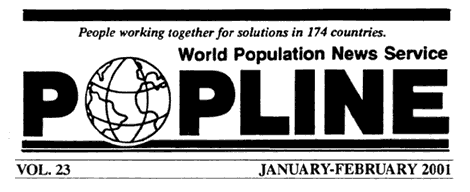
 Soaring Population Threatens SecurityChanges in population, scarcity of water and the spread of disease worldwide will have an increasing impact on the national security of the United States, the U.S. intelligence community has concluded. The assessment is contained in an intensive yearlong study prepared by the National Intelligence Council, an influential analytical think tank made up of senior intelligence officials that work alongside the U.S. Central Intelligence Agency. Entitled "Global Trends 2015," the 70page report estimates that 3 billion people, nearly half of the world's population, will live in "water-stressed" regions from southern California to northern China, and that even more genetically modified crops or desalination projects will not substantially alleviate the problem. By 2015, world population will grow from the current 6.1 billion to 7.2 billion, the report estimates, with 95 percent of the increase expected in the developing world and nearly all of it in rapidly expanding urban areas. Population pressures are expected to ensure that Middle East will be a regional trouble spot over the next 15 years as population burgeons anywhere from 26 percent in Algeria and 39 percent in Libya to 56 percent in Saudi Arabia. People of the region will be poorer, heavily concentrated in cities unable to cope and mere disillusioned with their governments. The report warns that as inequities continue to mount, Islamic fundamentalist movements may come to power. Water shortages are expect to constitute the key resource problem of the next decade and a half, and could cause regional instability. Turkey's construction of new irrigation projects on the Tigris and Euphrates rivers would reduce water flowing into Syria and Iraq. Similarly, ambitious projects in Ethiopia and Sudan could divert water from the Nile and reduce the flow into Egypt. John Gannon, chairman of the National Intelligence Council, said the purpose of the report is to encourage policy makers to focus on long-term global trends and to think beyond the ordinary concerns of the intelligence community. |